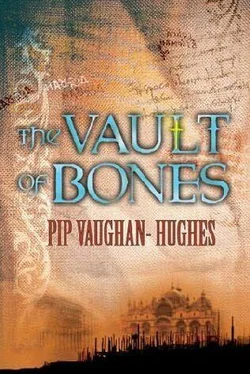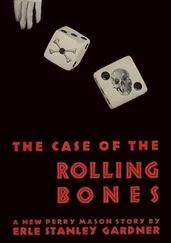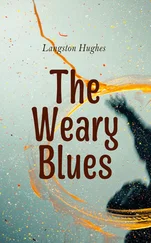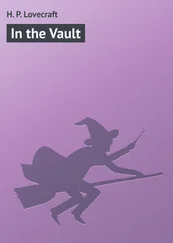Pip Vaughan-Hughes - The Vault of bones
Здесь есть возможность читать онлайн «Pip Vaughan-Hughes - The Vault of bones» весь текст электронной книги совершенно бесплатно (целиком полную версию без сокращений). В некоторых случаях можно слушать аудио, скачать через торрент в формате fb2 и присутствует краткое содержание. Жанр: Исторический детектив, на английском языке. Описание произведения, (предисловие) а так же отзывы посетителей доступны на портале библиотеки ЛибКат.
- Название:The Vault of bones
- Автор:
- Жанр:
- Год:неизвестен
- ISBN:нет данных
- Рейтинг книги:4 / 5. Голосов: 1
-
Избранное:Добавить в избранное
- Отзывы:
-
Ваша оценка:
- 80
- 1
- 2
- 3
- 4
- 5
The Vault of bones: краткое содержание, описание и аннотация
Предлагаем к чтению аннотацию, описание, краткое содержание или предисловие (зависит от того, что написал сам автор книги «The Vault of bones»). Если вы не нашли необходимую информацию о книге — напишите в комментариях, мы постараемся отыскать её.
The Vault of bones — читать онлайн бесплатно полную книгу (весь текст) целиком
Ниже представлен текст книги, разбитый по страницам. Система сохранения места последней прочитанной страницы, позволяет с удобством читать онлайн бесплатно книгу «The Vault of bones», без необходимости каждый раз заново искать на чём Вы остановились. Поставьте закладку, и сможете в любой момент перейти на страницу, на которой закончили чтение.
Интервал:
Закладка:
Chapter Fifteen
The next morning brought fog. It was chilly, and the Captain and I, accustomed as we were to the sun, shivered as we broke our fast with our Pisan hosts. Then we set out for the palace. We had nothing but our packs, and the Pisans offered us a servant to carry those to the inn. To be polite we accepted, but not the offer of a guide. The Captain could find his way, he said, and we set out. The dour mood of last night had vanished with the mornings fog, which the sun had indeed chased away, and I was fairly skipping as I followed the Captain along the foot of the walls, winding through a maze of lodgings, warehouses, offices and churches, some of which were still being built, and all of which hummed and sometimes raged with Italian voices, the sing-song dialects of Genoa and Venice, Pisa, Florence, Siena and a babel of others I did not recognise. It was here I heard my first Greek spoken, though the speakers were labourers working on one of the new Frankish churches, whose campanile was beginning to rise above the level of the sea walls. Soon afterwards we came to a gate, much broken down and guarded by sleepy-looking men-at-arms in the imperial red and gold livery, leaning on their spears in the shade and gossiping with each other in French. They did not bat an eyelash at us. Thus I entered Constantinople.
The street we found ourselves walking down was almost empty save for a few ancient crones in dusty black clothes who regarded us with icy indifference. As soon as we had passed through the gate I knew I was inside the rotten jawbone I had imagined from the boat. The houses around us, once grand, were in a horrible state of disrepair. Some were roofless, the sun shining through their upper windows. Those that were intact looked half occupied, with some windows boarded up and others showing a ragged curtain or a drape of tattered laundry. Every wall showed evidence of fire. I have said the street was near empty, but only of people: stray dogs, emaciated and flayed by mange, scurried everywhere, and the air was rank with their piss and turds. We hurried on under the impassive eyes of the old women. Turning a corner, we entered a wider thoroughfare, but the same neglect and ruin was in evidence here also. The buildings were high and flat-fronted, in the main, with many tiers of round-arched windows. They stood side by side so that often the street was a seamless wall of stone. The effect was majestic even now, and more than a little sinister. This had not been a city like the ones back home, I knew now, with their ramshackle houses of wood and mud all leaning on each other's shoulders like a congregation of drunkards. And it had paid a terrible price for its superiority.
Thus we made our way, mostly in silence, although the Captain would every now and again point out some landmark, or what had once been such, for invariably it was now a gutted shell. I could not believe how empty the streets were. This had been a city of a million people, and now… There were a few more old people here, and children with matted hair and dirty faces played in doorways and chased the dogs. I shook my head in dismay, but all of a sudden the Captain grabbed my shoulder and jerked me against the nearest wall. There was a cacophony of barking and curses, and a great pack of mangy dogs hurtled past us, driven by a company of men-at-arms who marched towards us up the street, swords and spears clinking against chain mail, jeering and swearing at the few people who were abroad. The old folk retreated into their houses, crossing themselves in the backwards Greek fashion, but some of the bolder children fell into step with the soldiers, tugging on their surcoats and holding out their hands. A couple of them were rewarded with small coins, but one, a cheeky boy with great brown eyes who was skipping about in front of the man who looked to be the company's leader and chanting 'Please! Please!' in Greek, came too close and the man suddenly lashed out, sending him sprawling over the flagstones. The others laughed and, to my horror, marched right over him, trampling his little body heedlessly with their boots. I was about to drag him out of the way, but the Captain stopped me, and indeed the little one picked himself up, dusted himself off and limped away to his fellows, who surrounded him, cackling. Meanwhile the soldiers had drawn abreast of us, and the one who had trampled the child glanced our way and saluted us, a twisted smile on his boozy face. I was about to tell him what was on my mind, but again the Captain stopped me, and replied to the soldier's greeting with a haughty lift of his chin. The soldiers clattered away towards the sea, and left the street to the dogs, the children, and ourselves.
We walked on, but the children, in search of fresh diversion, began to tag along behind us. We had gone a few paces when I felt a tug on the hem of my tunic.
'Lordos! Lordos!' The voice was a hoarse squeak. I turned and looked down into the dust-streaked face of the little boy. He was around nine years old, I judged, and his hair was thick with dust. A thin trickle of blood ran from each nostril, and he had wiped it crosswise across his cheek. What do you want, little one?' I asked him gently, in the Greek Anna had taught me. He stepped back in amazement.
'Coin, Lordos?' he asked again in Venetian. I pulled out a silver florin and and held it out to him.
'I am no lord’ I told him in Greek. He looked me up and down in disbelief, and I realised I was dressed in my finest Venetian clothes: short, point-sleeved tunic of white and black-striped silk; bronze silk surcoat with broad blue stripes, scalloped at the neck and hem with bronze ribbon; red woollen hose; saffron-coloured coif. I had my sword buckled on, and the knife hung next to my red leather purse. The boy snatched the coin and took a couple of hasty steps backwards. ‘Who are you, then?' he asked me in Greek.
‘Kakenas’ I told him. Nobody. He cocked his head and regarded me for a moment with hooded eyes. Confusion and perhaps anger came from him like the heat of a fever: I could feel it. For a moment I thought he would spit at me, but instead he bit the florin and turned his blood-smeared face up to mine once more before turning on his heel and running back to his mates.
We walked on through one ruined street after another. The very air was suffused with an oppressive melancholy, as if the ruined buildings were breathing it out through their blackened skull-mouths. °Where are all the people?' I asked quietly.
They fled, some of them’ the Captain answered. 'Like Anna's people, to Anatolia, Epiros. Scattered. But many did not flee.' He pointed to an empty house. It had been quite grand once, red brick trimmed with marble that had been carved, around windows and door, into thick, leafy vines. Now fat stains of soot stretched up from each blank cavity where a fire had once raged. 'They died in their houses, or in the streets. Or they were herded into the churches and butchered like vermin.'
'Raped on the altars.' It was something that Anna always said, and I always thought it a bit of hyperbole. Now I saw it must have happened just as she had told it.
Yes, then hacked to pieces. The crusaders hated the Greeks. Called them effete and soft, corrupted. Do they look effete now?' Indeed they do not.'
'This place… thirty-three years ago, in my lifetime, this place, this Constantinople, was the centre of the world,' he went on. He was angry, I realised: very angry, though not with me. 'It was the greatest city man has ever known. Look! This street is empty, save for that beggar, those children. That woman – is she a whore, or simply a pauper? There used to be a million people teeming here. A million! These walls would have swallowed every soul in London, Rome, Paris, all of them at once without a trace. Doge Dandolo and his crusaders looted and burned until there was nothing left. I was born the year the crusaders came here, but I have talked to old men who remember the city that was-'
Читать дальшеИнтервал:
Закладка:
Похожие книги на «The Vault of bones»
Представляем Вашему вниманию похожие книги на «The Vault of bones» списком для выбора. Мы отобрали схожую по названию и смыслу литературу в надежде предоставить читателям больше вариантов отыскать новые, интересные, ещё непрочитанные произведения.
Обсуждение, отзывы о книге «The Vault of bones» и просто собственные мнения читателей. Оставьте ваши комментарии, напишите, что Вы думаете о произведении, его смысле или главных героях. Укажите что конкретно понравилось, а что нет, и почему Вы так считаете.









